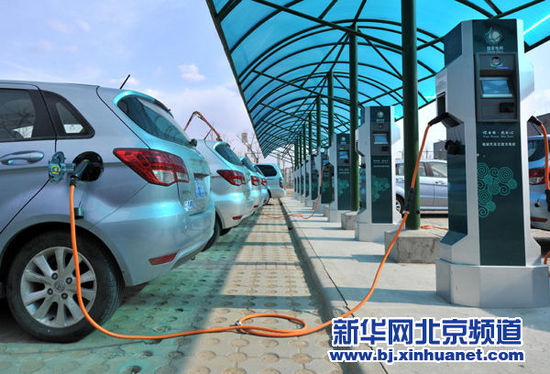


Govt support still needed to meet
China will end subsidies for new-energy vehicles (NEVs) after 2020, but analysts said on Sunday that government support for the sector is still needed.
In a post on the website of the Ministry of Finance (MOF) on Saturday, Finance Minister Lou Jiwei was quoted as saying that China plans to gradually phase out subsidies for NEVs and pursue market-based policies to support the development of the sector.
Some NEV manufacturers rely too much on government subsidies, which means that they lack the motivation to make technological breakthroughs, said Lou.
The MOF plans to cut the subsidies progressively, by 20 percent from 2016 levels during the 2017-18 period, and by 40 percent between 2019 and 2020. The subsidies will be eliminated altogether after 2021.
Su Hui, a senior analyst at the China Automobile Dealers Association, told the Global Times on Sunday that the authorities also want to crack down on subsidy-related fraud in the country's NEV industry.
According to media reports, some Chinese NEV producers fake sales figures in order to get subsidies. A report by The Economic Observer on January 16 citing an unnamed industry insider said that about 50,000 of the NEV sales in China in the first 10 months of 2015 were faked and the cars were not actually bought.
Four ministries including the MOF, the National Development and Reform Commission and the Ministry of Science and Technology are conducting a joint investigation into misuse of NEV subsidies, according to a statement from the MOF.
They have asked local authorities to look into it and submit the results before February 5.
"Subsidy-related fraud is not that common. And with the increasingly strict supervision, such practices will be eradicated," Su said.
But Su did not believe that the subsidies for NEVs will be completely phased out in the next five years. In fact, the central government may have to increase its support for the NEV industry in the coming years to fulfill its ambitious sales target of 5 million NEVs by 2020, Su noted.
In 2015, China produced 340,471 NEVs and sold 331,092 units, up 330 percent and 340 percent respectively year-on-year, according to data from the China Association of Automobile Manufacturers. But to stay on track to meet the sales target for 2020, Su noted that over 1 million NEVs will have to be sold by the end of 2016, which will be a challenge.
Market-based support
Feng Shiming, a senior industry analyst with Shanghai-based Menutor Consulting, also said that government support for the sector will be increased.
"Beyond government subsidies, the introduction of a market-based mechanism could help the NEV industry develop more sustainably," Feng told the Global Times on Sunday.
In order to secure consistent support for China's NEV industry after the disappearance of subsidies, the MOF said a more market-based system for sales will be established.
Lou praised the zero emission vehicle (ZEV) policy and credit trading system applied in California, which requires automakers to meet ZEV requirements via options such as producing low-emission vehicles and trading ZEV credits.
Between 2015 and 2017, for automakers with annual sales of more than 60,000 vehicles in the US, at least 14 percent of the production must meet ZEV requirements, according to the US Department of Energy. And those who fail to meet the target will face fines or sales restrictions.
Credit trading allows the market to determine the direction of NEV development and also help channel money to NEV producers for their R&D, decreasing their dependence on government subsidies, said Feng.
US premium electric car manufacturer Tesla Motors Inc is one of the biggest beneficiaries from California's ZEV policy, as it has been able to sell credits generated from its ZEVs to other companies in the past few years. In the third quarter of 2015, the company generated $39 million in revenue from selling ZEV credits, accounting for 4.2 percent of its total revenue.
In addition to support for NEV manufacturers, both Feng and Su called for further policy support for NEV battery producers and construction of electric car charging stations.
"Charging station infrastructure should be more open to private capital, in order to speed up the development of the NEV industry," said Feng.
 A foreign girl explains what China should be proud of
A foreign girl explains what China should be proud of Chinese navy's air-cushioned landing craft in pictures
Chinese navy's air-cushioned landing craft in pictures Chinese pole dancing master opens class in Tianjin
Chinese pole dancing master opens class in Tianjin PLA holds joint air-ground military drill
PLA holds joint air-ground military drill Charming female soldiers on Xisha Islands
Charming female soldiers on Xisha Islands Beautiful skiers wear shorts in snow
Beautiful skiers wear shorts in snow Getting close to the crew on China's aircraft carrier
Getting close to the crew on China's aircraft carrier Chinese stewardess celebrate test flight at Nansha Islands
Chinese stewardess celebrate test flight at Nansha Islands Pentagonal Mart becomes the largest vacant building in Shanghai
Pentagonal Mart becomes the largest vacant building in Shanghai Top 20 hottest women in the world in 2014
Top 20 hottest women in the world in 2014 Top 10 hardest languages to learn
Top 10 hardest languages to learn 10 Chinese female stars with most beautiful faces
10 Chinese female stars with most beautiful faces China’s Top 10 Unique Bridges, Highways and Roads
China’s Top 10 Unique Bridges, Highways and Roads Virtual reality takes porn ‘to the next level’
Virtual reality takes porn ‘to the next level’ Online spat won’t hinder cross-Straits ties
Online spat won’t hinder cross-Straits ties A look behind the scenes at China’s censorship watchdog
A look behind the scenes at China’s censorship watchdog $93m gay app deal raises questions over future of LGBT services
$93m gay app deal raises questions over future of LGBT servicesDay|Week